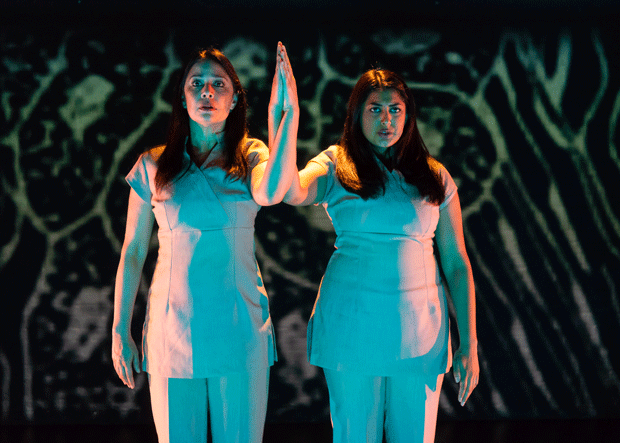A Frightening Future Awaits the Individual in Assembled Identity
A new play examines the nature of selfhood in an age of genetic modification.

(© Steven Pisano)
With the ubiquity of DNA testing kits and family-tree websites, it's never been easier to find answers to the question "Where do I come from?" We've become fascinated with the idea of discovering who we are in respect to race and ethnicity, as opposed to who we have become as a result of culture and upbringing. Purva Bedi, Kristin Marting, and Mariana Newhard examine where these different ideas of self overlap and diverge in their short, dystopian play Assembled Identity, now running at HERE. Though the piece doesn't consistently cohere as a narrative, it does raise provocative questions about what identity is and how scientific advances might potentially shape an individual's sense of self in alarming ways.
The play takes place in the not-too-distant future at a government agency called the Federal Registry of Genetics (run, tellingly, by the Centers for Disease Control and Prevention). Mariana Newhard and Lipica Shah play identical twins, known as A1 and A2, who have reported to the center because of a mysterious illness (there are more than a few thematic similarities to the television show Orphan Black in this play). While there, unseen scientists subject them to a series of intensive tests that analyze their genetic makeup and their responses to interactions with dozens of women who have also reported to the center — all of whom look exactly like A1 and A2. The twins soon discover that they and the other women are clones whose genes and behavior are being modified in order to eliminate defects and unbeneficial characteristics from the human species. A1 and A2 have opposing views on the ethics of this undertaking, and they debate the issue as they cling futilely to the identities they thought they had.
Newhard and Shah adroitly portray the twins as well as several foreign-language-speaking clones (translations from Spanish, Tagalog, and other languages are provided within David Bengali's impressively detailed projections, which reveal A1's and A2's test results and other aspects of the play's technological world in the background). Both actors also occasionally break out into songs (composed by Drew Weinstein) and dances (choreographed by Alexandra Beller) that comment chorus-like on the action, but these Greek-tragedy-style interludes seem distractingly out of place.
Still, director Kristin Marting and her cowriters give audiences plenty of tragic-sounding questions to contemplate, especially now that gene editing techniques such as CRISPR technology are no longer the stuff of sci-fi. The play ends with more questions than answers. Despite science's promise to potentially cure human illnesses, what could happen if gene editing is used in unethical ways? If genetic codes are altered in individuals, will science be able to manufacture or manipulate personality as well? And in a world where cloning exists, would "identity" mean anything at all? Over the course of an hour, Assembled Identity asks some important questions and leaves it to us to try to put together some answers.







